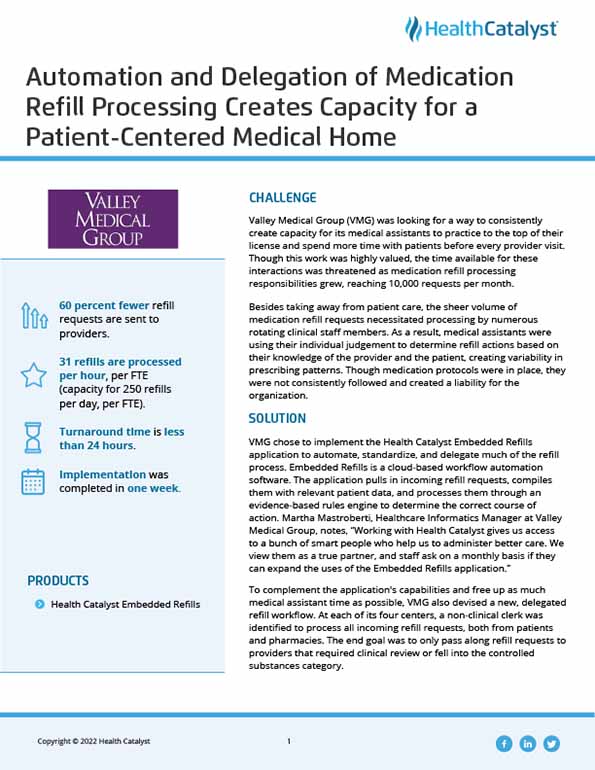Valley Medical Group sought to consistently create capacity for its medical assistants to practice to the top of their license and spend more time with patients before every provider visit. The organization implemented the Health Catalyst Embedded Refills application to automate, standardize, and delegate much of the refill process.
Valley Medical Group (VMG) was looking for a way to consistently create capacity for its medical assistants to practice to the top of their license and spend more time with patients before every provider visit. Though this work was highly valued, the time available for these interactions was threatened as medication refill processing responsibilities grew, reaching 10,000 requests per month.
Besides taking away from patient care, the sheer volume of medication refill requests necessitated processing by numerous rotating clinical staff members. As a result, medical assistants were using their individual judgment to determine refill actions based on their knowledge of the provider and the patient, creating variability in prescribing patterns. Though medication protocols were in place, they were not consistently followed and created a liability for the organization.
VMG chose to implement the Health Catalyst Embedded Refills application to automate, standardize, and delegate much of the refill process. Embedded Refills is a cloud-based workflow automation software. The application pulls in incoming refill requests, compiles them with relevant patient data, and processes them through an evidence-based rules engine to determine the correct course of action. Martha Mastroberti, Healthcare Informatics Manager at Valley Medical Group, notes, “Working with Health Catalyst gives us access to a bunch of smart people who help us to administer better care. We view them as a true partner, and staff ask on a monthly basis if they can expand the uses of the Embedded Refills application.”
To complement the application's capabilities and free up as much medical assistant time as possible, VMG also devised a new, delegated refill workflow. At each of its four centers, a non-clinical clerk was identified to process all incoming refill requests, both from patients and pharmacies. The end goal was to only pass along refill requests to providers that required clinical review or fell into the controlled substances category.
Once turned on, the Embedded Refills application began sending processed refill messages to each non-clinical clerk’s inbox with the following categories: In Protocol, Out of Protocol, Off Protocol, Duplicate, and Controlled. Those categorized as In Protocol and Duplicate are handled entirely by the clerk and no longer require provider review.
Regarding how the application supports VMG's patient-centered medical home approach, Mastroberti adds, “We are responsible for this population, even if they don’t walk through the door. Embedded Refills gives us what we need to take care of people wherever they are. We don’t want to have people come into the clinics just to get their meds. Instead, we want them to live their lives and get their meds without hoops to jump through.”
The implementation of the Embedded Refills application was fast due, with the technical implementation taking just one week to complete and gaining internal consensus on protocols required an additional two weeks. In less than a month, staff began benefiting from Embedded Refills. On an ongoing basis, requests sent to the Health Catalyst customer success team are routinely resolved within 24 hours, which has built trust and confidence across the VMG team.
Across the four non-clinical clerks, 500 refills are processed daily by lunchtime at a rate of up to 125 refills an hour. This same group now spends afternoons completing prior authorizations on behalf of the clinicians they support.
Of the incoming requests, clerks auto-deny duplicate requests (25 percent of incoming volume), auto-approve in-protocol requests (25 percent of incoming volume), and can independently correct signature mismatches (10 percent of incoming volume). As a result, VMG has reduced the number of refill requests sent to providers by 60 percent.
With Embedded Refills, only 40 percent of incoming refill requests ever make it to clinical staff, and their freed-up time is now spent supporting the patient-centered medical home model. Medical assistants are no longer scrambling around to finish up work in inboxes, and they are able to see patients in the clinic and follow up with phone calls to drive quality care.


